- Home
- Charles de Lint
Moonlight and Vines Page 6
Moonlight and Vines Read online
Page 6
Imogen looked away then. She shifted her position slightly, settling her back against the bench. After a few moments, she leaned her head against Nita’s.
“What do you think it’s like when you die?” Nita asked. “Do you think everything’s just over, or do we, you know, go on somewhere?”
“I think we go on.”
“What’ll you miss the most?”
Imogen shrugged. “What would you miss if you were in my position?”
“Nothing.”
“Not even your daughter?”
Nita didn’t even bother to ask how Imogen knew about Amanda.
“You’ve got to understand,” she said. “I love her. And it makes me feel good to know that something I was a part of making isn’t fucked up. But it makes me feel even better knowing that she’s going to be raised properly. That she’ll be given all the chances I never had. I didn’t want her to grow up to be like me.”
“But you still visit her.”
Nita nodded. “But once she’s old enough to understand what I am, I’ll stop.”
If not sooner. If John’s old man didn’t get the judge to revoke her visitation rights because of what he’d seen her doing tonight.
“It’s getting late,” Imogen said. She stood up, drawing Nita to her feet.
“Where’re we going?”
“To my apartment.”
5
To call it an apartment was a bit of a misnomer. It turned out that Imogen owned the penthouse on top of the Brighton Hotel, overlooking the harbor. The only time Nita had ever seen a place this fancy was in the movies. While Imogen went to get her a drink, she walked slowly around the immense living room, trailing her hand along the polished wood tables and the back of a chesterfield that could seat five people comfortably. There was even a baby grand in one corner. She finally ended up at the glass doors leading out onto a balcony where she saw two images superimposed over each other: a view of the lake and Wolf Island in the distance, and one of herself standing at the window with the living room behind her, Imogen walking toward her with a brandy glass in each hand.
Nita turned to accept the brandy. Imogen touched her glass against Nita’s and then they both drank.
“Why’d you pick me?” Nita asked.
“The name on the flyer outside the club first caught my eye,” Imogen said. “Then, when I began to study your life, I realized that we are much the same. I was like you, before the change—deadened by the ennui of my life, feeding on the admiration of those who courted my favor much the same as you do with those who come to watch you dance. It’s not such a great leap from using their base interest as a kind of sustenance to taking it from their flesh and blood.”
Nita couldn’t think of anything to say in response to that so she took another sip of her brandy.
“I want you to have this when I’m gone,” Imogen went on.
“Have what?”
Imogen made a languid movement with her arm that encompassed the penthouse. “This place. Everything I have. I’ve already made the arrangements for everything to be transferred into your name—barring unforeseen difficulties, the transaction will be completed tomorrow at noon.”
“But—”
“I have amassed a considerable fortune over the years, Nita. I want it to go to you. It will give you a chance to make a new start with your life.”
Nita shook her head. “I don’t think it’d work out.”
She’d won a thousand dollars in a lotto once. She’d planned to do all sorts of sensible things with it, from taking some development courses to better herself to simply saving it. Instead, she’d partied so hearty over the space of one weekend she’d almost put herself in the hospital. The only reason she hadn’t ended up in emergency was that everybody else that weekend had been too wasted to help her. She still didn’t know how she’d managed to survive.
“It’d just make me fuck up big-time,” she said.
Imogen nodded—not so much in acceptance of what she was saying, Nita realized, as to indicate that she was listening.
“I have to admit that I haven’t been entirely honest with you,” Imogen said. “What we’re about to embark upon when the sun rises could be very dangerous to you.”
“I . . . don’t understand.”
“I won’t die the instant the sunlights strikes me,” Imogen said. “It will take a few minutes—enough time for the beast inside me to rise. If it can feed immediately and get out of the sun, it will survive.”
“You mean you’d . . . eat me?”
“It’s not something I would do, given a choice. But the survival instinct is very strong.”
Nita knew about that. She’d tried to kill herself three times to date—deliberately, that is. Twice with pills, once with a razor blade. It was astonishing how much she’d wanted to survive, once it seemed she had no choice but to die.
“I will fight that need,” Imogen told her. “It’s why I’ve been fasting. To make the beast weak. But I can’t guarantee your safety.”
Nita filled in the silence that followed by lighting a cigarette.
“Understand,” Imogen said, “it’s not what I want. I don’t normally have conversations with my meals any more than you would with a hamburger you’re about to eat. I truly believe that it’s time for me to put the monster to rest and go on. Long past time. But the beast doesn’t agree.”
“You’ve tried this before, haven’t you?” Nita asked.
Imogen nodded.
“What happened?”
“I’m still here,” Imogen said.
Nita shivered. She silently finished her cigarette, then butted it out in an ornate silver ashtray.
“I’ll understand if you feel you must leave,” Imogen said,
“You’d let me go—even with everything I now know?”
Imogen gave her a sad smile. “Who’d believe you?”
Nita lit another cigarette. She was surprised to see that her hands weren’t even shaking.
“No,” she said. “I’ll do it. But not for the money or this place.”
“It will still be in your name,” Imogen said.
Unspoken between them lay the words: if you survive the dawn.
Nita shrugged. “Whatever.”
Imogen hesitated, then it seemed she had to ask. “Is it that you care so little about your life?”
“No,” Nita said. “No matter how bad shit gets, whenever it comes down to the crunch, I always surprise myself at how much I want to live.”
“Then why will you see this through?”
Nita smiled. “Because of you. Because of what you said about us having to be strong and stand up for each other. I won’t say I’m not scared, ’cause I am, but . . .” She turned to the glass doors that led out onto the balcony. “I guess it’s time, huh? We better get to it before I bail on you.”
She put down the glass and butted out her cigarette after taking a last drag. Imogen stepped forward. She brushed Nita’s cheek with her lips, then hand in hand they went out onto the balcony to meet the dawn.
The Big Sky
We need Death to be a friend. It is best to have
a friend as a traveling companion when you
have so far to go together.
—attributed to Jean Cocteau
1
She was sitting in John’s living room when he got home from the recording studio that night, comfortably ensconced on the sofa, legs stretched out, ankles crossed, a book propped open on her lap which she was pretending to read. The fact that all the lights in the house had been off until he turned them on didn’t seem to faze her in the least. She continued her pretense, as though she could see equally well in the light or dark and it made no difference to her whether the lights were on or off. At least she had the book turned right-side up, John noted.
“How did you get in?” he asked her.
She didn’t seem to present any sort of a threat—beyond having gotten into his locked house, of course—so he was more concerned w
ith how she’d been able to enter than for his own personal safety. At the sound of his voice, she looked up in surprise. She laid the book down on her lap, finger inserted between the pages to hold her place.
“You can see me?” she said.
“Jesus.”
John shook his head. She certainly wasn’t shy. He set his fiddle-case down by the door. Dropping his jacket down on top of it, he went into the living room and sat down in the chair across the coffee table from her.
“What do you think?” he went on. “Of course I can see you.”
“But you’re not supposed to be able to see me—unless it’s time and that doesn’t seem right. I mean, really. I’d know, if anybody, whether or not it was time.”
She frowned, gaze fixed on him, but she didn’t really appear to be studying him. It was more as though she was looking into some unimaginably far and unseen distance. Her eyes focused suddenly and he shifted uncomfortably under the weight of her attention.
“Oh, I see what happened,” she said. “I’m so sorry.”
John leaned forward, resting his hands on his knees. “Let’s try this again. Who are you?”
“I’m your watcher. Everybody has one.”
“My watcher.”
She nodded. “We watch over you until your time has come, then if you can’t find your own way, we take you on. They call us the little deaths, but I’ve never much cared for the sound of that, do you?”
John sighed. He settled back in his chair to study his unwanted guest. She was no one he knew, though she could easily have fit in with his crowd. He put her at about twenty-something, a slender five-two, pixy features made more fey by the crop of short blonde hair that stuck up from her head with all the unruliness of a badly-mowed lawn. She wore black combat boots; khaki trousers, baggy, with two or three pockets running up either leg; a white T-shirt that hugged her thin chest like a second skin. She had little in the way of jewelry—a small silver ring in her left nostril and another in the lobe of her left ear—and no makeup.
“Do you have a name?” he tried.
“Everybody’s got a name.”
John waited a few heartbeats. “And yours is?” he asked when no reply was forthcoming.
“I don’t think I should tell you.”
“Why not?”
“Well, once you give someone your name, it’s like opening the door to all sorts of possibilities, isn’t it? Any sort of relationship could develop from that, and it’s just not a good idea for us to have an intimate relationship with our charges.”
“I can assure you,” John told her. “We’re in no danger of having a relationship—intimate or otherwise.”
“Oh,” she said. She didn’t look disappointed so much as annoyed. “Dakota,” she added.
“I’m sorry?”
“You wanted to know my name.”
John nodded. “That’s right. I—oh, I get it. Your name’s Dakota?”
“Bingo.”
“And you’ve been . . . watching me?”
“Well, not just you. Except for when we’re starting out, we look out after any number of people.”
“I see,” John said. “And how many people do you watch?”
She shrugged. “Oh, dozens.”
That figured, John thought. It was the story of his life. He couldn’t even get the undivided attention of some loonie stalker.
She swung her boots to the floor and set the book she was holding on the coffee table between them.
“Well, I guess we should get going,” she said.
She stood up and gave him an expectant look, but John remained where he was sitting.
“It’s a long way to the gates,” she told him.
He didn’t have a clue as to what she was talking about, but he was sure of one thing.
“I’m not going anywhere with you,” he said.
“But you have to.”
“Says who?”
She frowned at him. “You just do. It’s obvious that you won’t be able to find your way by yourself and if you stay here you’re just going to start feeling more and more alienated and confused.”
“Let me worry about that,” John said.
“Look,” she said. “We’ve gotten off on the wrong foot—my fault, I’m sure. I had no idea it was time for you to go already. I’d just come by to check on you before heading off to another appointment.”
“Somebody else that you’re watching?”
“Exactly,” she replied, missing, or more probably, ignoring the sarcastic tone of his voice. “There’s no way around this, you know. You need my help to get to the gates.”
“What gates?”
She sighed. “You’re really in denial about all of this, aren’t you?”
“You were right about one thing,” John told her. “I am feeling confused—but it’s only about what you’re doing here and how you got in.”
“I don’t have time for this.”
“Me neither. So maybe you should go.”
That earned him another frown.
“Fine,” she said. “But don’t wait too long to call me. If you change too much, I won’t be able to find you and nobody else can help you.”
“Because you’re my personal watcher.”
“No wonder you don’t have many friends,” she said. “You’re really not a very nice person, are you?”
“I’m only like this with people who break into my house.”
“But I didn’t—oh, never mind. Just remember my name and don’t wait too long to call me.”
“Not that I’d want to,” John said, “but I don’t even have your number.”
“Just call my name and I’ll come,” she said. “If it’s not too late. Like I said, I might not be able to recognize you if you wait too long.”
Though he was trying to take this all in stride, John couldn’t help but start to feel a little creeped out at the way she was going on. He’d never realized that crazy people could seem so normal—except for what they were saying, of course.
“Goodbye,” he told her.
She bit back whatever it was that she was going to say and gave him a brusque nod. For one moment, he half expected her to walk through a wall—the evening had taken that strange a turn—but she merely crossed the living room and let herself out the front door. John waited for a few moments, then rose and set the deadbolt. He walked through the house, checking the windows and back door, before finally going upstairs to his bedroom.
He thought he might have trouble getting to sleep—the woman’s presence had raised far more questions than it had answered—but he was so tired from twelve straight hours in the studio that it was more a question of, could he get all his clothes off and crawl under the blankets before he faded right out? He had one strange moment: when he turned off the light, he made the mistake of looking directly at the bulb. His uninvited guest’s features hung in the darkness along with a hundred dancing spots of light before he was able to blink them away. But the moment didn’t last long and he was soon asleep.
2
He didn’t realize that he’d forgotten to set his alarm last night until he woke up and gave the clock a bleary look. Eleven-fifteen. Christ, he was late.
He got up, shaved and took a quick shower. You’d think someone would have called him from the studio, he thought as he started to get dressed. He was doing session work on Darlene Flatt’s first album and the recording had turned into a race to get the album finished before her money ran out. He had two solos up first thing this morning and he couldn’t understand why no one had called to see where he was.
There was no time for breakfast—he didn’t have much of an appetite at the moment anyway. He’d grab a coffee and a bagel at the deli around the corner from the studio. Tugging on his jeans, he carried his boots out into the living room and phoned the studio while he put them on. All he got was ringing at the other end.
“Come on,” he muttered. “Somebody pick it up.”
How could there be nobody ther
e to answer?
It was as he was cradling the receiver that he saw the book lying on the coffee table, reminding him of last night’s strange encounter. He picked the book up and looked at it, turning it over in his hands. There was something different about it this morning. Something wrong. And then he realized what it was. The color dust wrapper had gone monochrome. The book and . . . His gaze settled on his hand and he dropped the book in shock. He stared at his hand, turning it front to back, then looked wildly around the living room.
Oh, Jesus. Everything was black and white.
He’d been so bleary when he woke up that he hadn’t noticed that the world had gone monochrome on him overnight. He’d had a vague impression of gloominess when he got up, but he hadn’t really thought about it. He’d simply put it down to it being a particularly overcast day. But this . . . this . . .
It was impossible.
His gaze was drawn to the window. The light coming in was devoid of color where it touched his furniture and walls, but outside . . . He walked slowly to the window and stared at his lawn, the street beyond it, the houses across the way. Everything was the way it was supposed to be. The day was cloudless, the colors so vivid, the sunlight so bright it hurt his eyes. The richness of all that colour and light burned his retinas.
He stood there until tears formed in his eyes and he had to turn away. He covered his eyes with his hands until the pain faded. When he took his palms away, his hands were still leached of color. The living room was a thousand monochrome shades of black and white. Numbly, he walked to his front door and flung it open. The blast of color overloaded the sensory membranes of his eyes. He knelt down where he’d tossed his jacket last night and scrabbled about in its pockets until he found a pair of shades.
The sunglasses helped when he turned back to the open door. It still hurt to look at all that color, but the pain was much less than it had been. He shuffled out onto his porch, down the steps. He looked at what he could see of himself. Hands and arms. His legs. All monochrome. He was like a black and white cutout that someone had stuck onto a colored background.

 Widdershins
Widdershins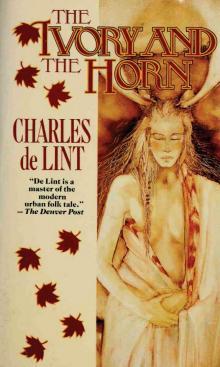 The Ivory and the Horn
The Ivory and the Horn Yarrow
Yarrow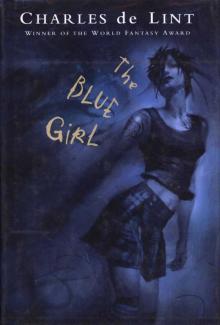 The Blue Girl
The Blue Girl Spirits in the Wires
Spirits in the Wires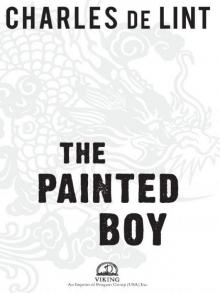 The Painted Boy
The Painted Boy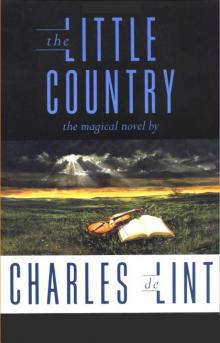 The Little Country
The Little Country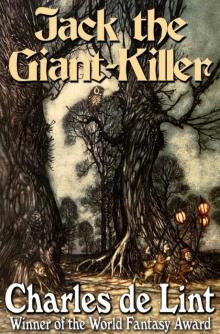 Jack of Kinrowan: Jack the Giant-Killer / Drink Down the Moon
Jack of Kinrowan: Jack the Giant-Killer / Drink Down the Moon Moonheart
Moonheart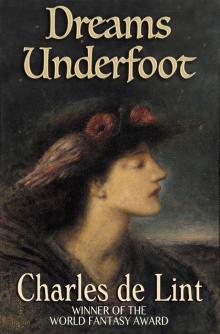 Dreams Underfoot
Dreams Underfoot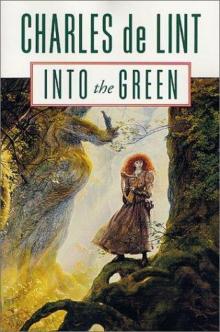 Into the Green
Into the Green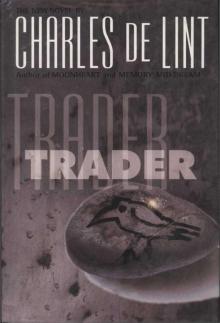 Trader
Trader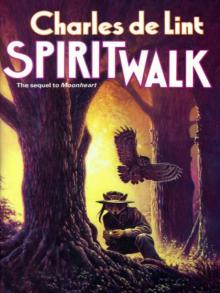 Spiritwalk
Spiritwalk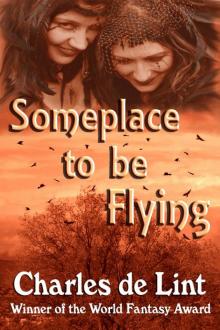 Someplace to Be Flying
Someplace to Be Flying Jack in the Green
Jack in the Green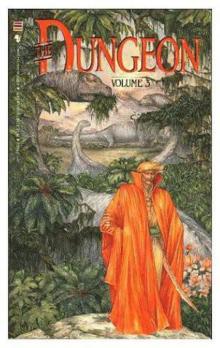 The Valley of Thunder
The Valley of Thunder Out of This World
Out of This World The Cats of Tanglewood Forest
The Cats of Tanglewood Forest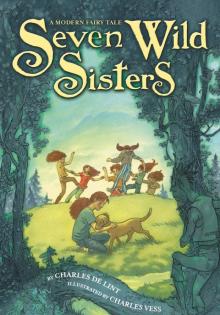 Seven Wild Sisters
Seven Wild Sisters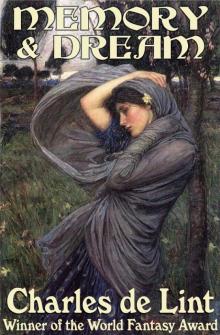 Memory and Dream
Memory and Dream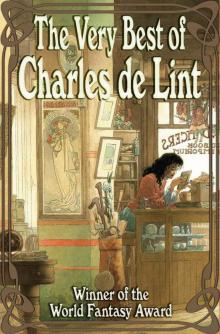 The Very Best of Charles De Lint
The Very Best of Charles De Lint Under My Skin
Under My Skin Forests of the Heart
Forests of the Heart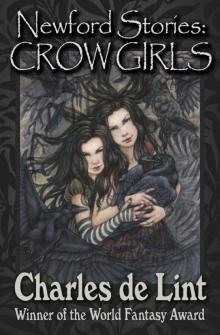 The Newford Stories
The Newford Stories Moonlight and Vines
Moonlight and Vines Angel of Darkness
Angel of Darkness The Onion Girl
The Onion Girl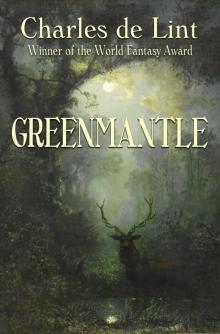 Greenmantle
Greenmantle Waifs And Strays
Waifs And Strays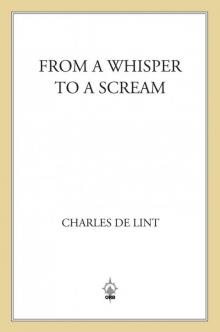 From a Whisper to a Scream
From a Whisper to a Scream Over My Head
Over My Head The Ivory and the Horn n-6
The Ivory and the Horn n-6 Our Lady of the Harbour
Our Lady of the Harbour Dreams Underfoot n-1
Dreams Underfoot n-1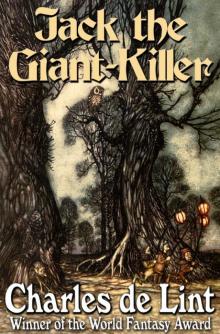 Jack the Giant-Killer (Jack of Kinrowan Book 1)
Jack the Giant-Killer (Jack of Kinrowan Book 1)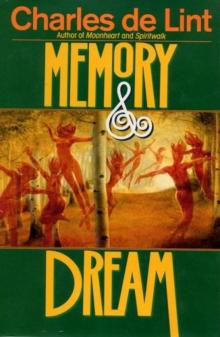 Memory and Dream n-5
Memory and Dream n-5 Under My Skin (Wildlings)
Under My Skin (Wildlings)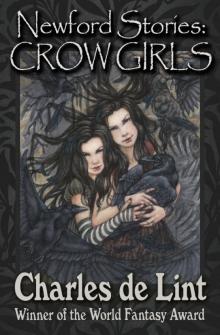 Newford Stories
Newford Stories The Wind in His Heart
The Wind in His Heart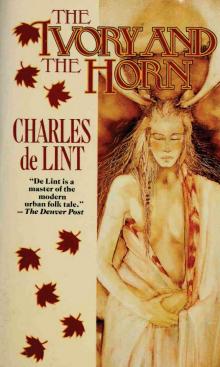 Ivory and the Horn
Ivory and the Horn